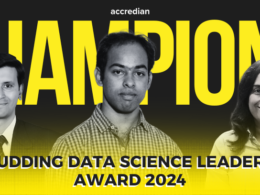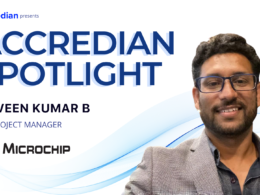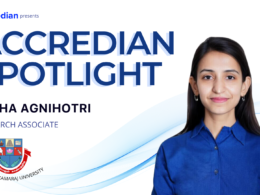Being in the oil and gas industry for over 16 years, Clifer Fernandez has not only worked offshore at oil rigs but also in office, managing teams. But what grabbed his attention was the thrill of data analysis and neural networks. And this led him to search for the right data science course in Mumbai and take up the Global Certificate in Data Science (GCD) program, and later, the Global Certificate in Data Science & AI (GCDAI) program at Accredian.
In this interview, let’s see how his quest to the world of data science has been and why he thinks data science is the elixir of the future.
Question 1: Which program & batch are you part of at Accredian & tell us more about your current work profile?
Clifer: I’m part of the April 2020 cohort of Accredian’s online data science course in Mumbai. I initially signed up for the GCD program, but later upgraded to the GCDAI. Three months into the course, I saw the value I was getting out of it, and I decided to complete the whole course. As far as my work is concerned, I’m currently in-between careers.
I spent over 16 years in the oil and gas industry in various roles, right from being in the field in offshore oil rigs to being in the office in engineering, and then, in sales roles. I’ve been working in different countries, starting from the UK, Indonesia, to West African countries. And finally, during the downturn in the oil industry around 2016, I came back to India and decided to take a short break before I tried something new.
Question 2: Walk us through your career journey & what got you interested in Data Science & Machine Learning?
Clifer: I started in the oil and gas industry in 2001 in a field role working in the offshore oil rigs. My master’s degree in Geology got me into the oil and gas industry. I also worked as a data engineer for a logging company, basically an oilfield services company, and worked with geo services, which is now part of Schlumberger.
Part of my job there was to watch the data streams coming from all the drilling sensors around the rig into the control room where they were managed. Observing and managing these data streams, got me very much interested in analysis. That was essentially a stepping stone for me into the world of analysis.
My extensive involvement in data analysis while working with engineers or tenders for major oil projects led me to data science. And for the past couple of years, I actively looked into data science as a subject. When I returned to India, I got a chance to research on it better and got more interested. Then finally, I took the plunge and took up Accredian’s online data science course in Mumbai.
Question 3: What tools and packages in Data Science & Machine Learning have you mastered in your Data Science & AI program at Accredian so far?
Clifer: Talking about mastering data science and machine learning packages, I wouldn’t say that I have got any of them. Because every time I look into these packages, I always end up learning something new. Even after six months into the course, I’m still finding ways to do unique bits and pieces with code on NumPy and Pandas. So, I’m learning every day and I wouldn’t say I’ve mastered it yet.
Question 4: What are some initial challenges when you got started on your Data Science journey, and how did you overcome them?
Clifer: When I started my data science journey, my initial challenge was coding because I come from a non-coding background. I have done minimal coding in C. But that was almost 25 years ago. However, the only way I got over it was sitting in practice and looking up StackOverflow, googling code, trying to understand explanations. So I would say that my initial challenge in coding was overcome by just keeping at it and not giving up.
Question 5: Who is your favorite faculty at Accredian, and what did you learn from him the Most?
Clifer: I wouldn’t say I have a favorite faculty because so far in the online data science course in Mumbai I have only had classes with Suchit and Deepesh. And I think they are both excellent instructors in their different ways.
Suchit is exceptional because he gets us involved when he is coding in NumPy, Pandas, etc. And, Deepesh is wonderful in machine learning as he explains the theory with such detail. I think it is a very good approach.
After all, if you understand the idea, then understanding the code is very simple. And as code keeps changing all the time, I’m not worried about remembering the code. I can always figure out how to do it, especially, if I know the theory.
Question 6: What is the goal of Data Science?
Clifer: To me, the goal of data science is to allow informed decision making. I think data science has a significant role to play in analyzing huge amounts of data, looking at their statistical relationships, etc. that we never even realized existed and allow us to make informed decisions. And this is exactly while more professionals, irrespective of industry should take up data science course in Mumbai or in their respective cities to upskill as quickly as possible.
Question 7: In your view, how has Data Science evolved in the last few years?
Clifer: In the last few years, we have seen the rise of prominent data scientists. But having said that, I think the word data science is a comparatively new terminology as statistical calculations and analysis has been performed by people earlier as well. The only difference is that they were done by pen and paper and, therefore, the process was slow.
But with the increase of computers and automated systems, we’re finding ways of doing the same thing in faster and better ways. Data science has enabled young professionals to take up statistical responsibilities without any background in maths or having PhDs. So I think in that way, it has evolved significantly. I see in the future we are going to achieve much more as more young professionals are getting interested in data science nowadays.
Question 8: What are the current trends in Data Science that you are most excited about?
Clifer: Coming from the oil and gas industry, automation is something that has always interested me a lot. So I tend to look at how data science is helping towards automation. One of the things I’m very much excited about is specific to the oil and gas industry.
A lot of work in oil rigs to extract oil and gas are now being done through automated smart systems which have reduced a lot of human errors and accidents on the field.
I was involved in a couple of projects years ago, wherein we were doing a lot of automation to remotely control offshore systems online. And this type of automation is something that really excites me.
Question 9: Which are some of the blogs that you follow?
Clifer: I don’t follow any blogs. I search online mostly. And, whenever I come across interesting articles, I usually save the name of the author or the website and use Google to track any updates on these websites and send me a reminder or a summary as such.
Having come from the oil and gas industry, I do follow our research papers on the SPE website (Society of Petroleum Engineers), to see how data science is automating many of the systems.
Question 10: What is your advice to anyone wanting to start a career in Data Science?
Clifer: My advice to anybody wanting to start a career in data science is don’t be intimidated by anything you read online. If you have an affinity for data analytics, you like looking at Big Data, you’ve enjoyed working with Excel sheets and analysis, then I think this is an excellent path to go on. You should enroll for a data science course in Mumbai or whichever city you belong it or want to study in. And, although there is a lot of math and theory involved, a basic understanding of the subject will help you quickly grasp the essence of a theory, or equation.
This was a conversation with one of our GCDAI students – Clifer Fernandez.
For more such interesting student interviews, check out Accredian Spotlight.





